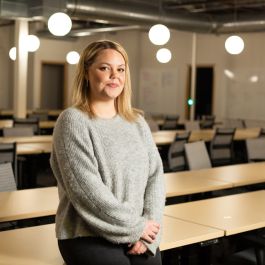When Zoe Pappas got in touch with her sales prospect, he was milking a cow. Could he call her back?
As a sales lead for Barn2Door, a SaaS company that enables farmers to sell their goods directly to consumers and chefs, Pappas said this was a pretty typical scenario.
“That is what I love about working with farmers — they are the nicest people,” Pappas said. “They could be up in a tree cutting down limbs and they’d still answer their phone. They’re so communicative and happy we’re here, so it’s easy to want to support them.”
Working closely with farmers is part of the gig for every salesperson at Barn2Door, but according to Sales Manager Mackenzie Fenton Conlan, building relationships doesn’t start and end with customer interaction — it permeates throughout the company.
We really care about the product and the people we’re serving. We’re competitive, but more so, we’re happy to help each other.”
The result is a sales team that’s as close-knit as they are hungry to close deals, a mix of teamwork and competition that, according to Sales Lead Griffin Lehman, is rare.
“My last sales job was very competitive,” Lehman said. “It wasn’t as driven toward a main goal. Here, things are much easier because my team really cares about the company’s mission. I’ve never heard anyone complain about jumping on a new hire’s demo — everyone is happy to lend a hand to someone who needs assistance.”
“A big difference with Barn2Door is that we’re all passionate about what we do,” Pappas said. “We really care about the product and the people we’re serving. We’re competitive, but more so, we’re happy to help each other.”
Competitive yet collaborative — how does Barn2Door’s sales team pull it off? To find out, Built In Seattle spoke with Pappas, Fenton Conlon and Lehman to see what makes their team tick and why working together makes for a more meaningful sales career.

Before we get into your team dynamic, can you give us a little background on what selling for Barn2Door is like?
Sales Lead Zoe Pappas: It’s really exciting to have a sales cycle that’s, on average, 14 days. Sometimes you can literally get on a call and close within days, while other deals you work longer. Whether the sales cycle is days or weeks, we build rapport with our farmers and have a strong relationship with them.
It’s rewarding to learn about their farms and what type of problems they’re facing, then be able to provide them with a solution. At the end of a sale, we get to see them happy and excited about what’s to come.
The sales team is described as “competitive yet collaborative.” What does that mean?
Sales Manager Mackenzie Fenton Conlan: Being competitive is a really big part of sales in general, and we do have competitions with each other and among teams. But at the end of the day, we know we will achieve more individually if we are focused on our team goals and team success. We train as a team, to improve as individuals. We encourage each other and share what works so we can implement best practices across the team. Finally, thanks to the executive team and company vision, we understand from a metrics perspective what we are aiming to achieve and why. We know that what we do on a daily basis matters for the success of the business. It’s exciting and rewarding to know the company is counting on us and cheering us on — and that other departments want us to win individually and as a team.
Sales Lead Griffin Lehman: Everyone here is competitive — we want to hit our own numbers and our own goals. But we’re all really working toward the company’s goals because we want to grow Barn2Door. It’s rewarding to work in a sales role where you deeply believe in what you’re selling and see how much of a difference it is making for people. In our case it gets even better, we are helping change not only the lives and businesses of farmers but ultimately have the opportunity to alter the future of our food system. When I win as a salesperson, I know that farmers are winning and sustainable food is winning. We have the opportunity to help connect people to local quality food and even change the way that people eat. We all really share a passion for our mission and that’s a big part of why we’re so collaborative.
Farmers Aren’t Really On LinkedIn
How do you help each other stay knowledgeable about farming and sales best practices?
Lehman: In your first week here, you go through initial agricultural and industry-specific training. I didn’t even know what a CSA (community supported agriculture) was before I came on — Mackenzie taught me that. Every Friday, the sales team gets together to talk about different products or practices; we might discuss proteins like cattle or pork, or regenerative or no-till farming, just to keep everyone informed and knowledgeable on the subject.
We do a lot of role-playing with new hires. We don’t just focus on cold-calling, rather we practice scenarios specific to our industry. For example, when a new hire calls, I will pretend to be a farmer on their tractor. It happens more often than you’d think! That farmer will talk really loud to compensate for the tractor engine noise. I might say, “Hey, I’m on my tractor and I can’t hear. Can we talk later?”
Having ongoing sales, practices and product training in place is really important for a holistic learning process and one way we empower individuals to be successful.”
Fenton Conlan: We’ll also have ongoing training on sales from objection handling to discovery and how to work a contact because we have people who have never worked in sales before. I have an agricultural background, but I have never worked in sales. I’m a little bit opposite to Zoe and Griffin in that regard — they both had sales experience but not an agricultural background. Having ongoing sales, practices and product training in place is really important for a holistic learning process and one way we empower individuals to be successful.
What does collaboration look like in the context of your sales duties?
Pappas: I can think of a situation that happened recently with a noteworthy farm in California. Because they’re a larger operation, it took a few more calls and the sales process wasn’t quite as short as some others are. To help, I brought another person on one of my calls with me. That helps show we’re experts and have a whole team and support system — it’s not just one person that’s out to help them succeed. That little reminder made all the difference, and we were able to bring on that farm.
Fenton Conlan: We do a lot of cross-team training, putting people in new situations and with different people, to enable them to grow. For example, I may have a mid-level salesperson that’s been getting a little stuck, so I’ll throw them on a handful of calls with a new trainee. This is a win-win, as the mid-level person is sharing knowledge while also hearing a new person messaging and answering questions in a fresh way.
There are also small things we do that are silly and fun to help people get into the spirit of closing deals. For instance, on the last day of every month, everyone on the team wears green, which gives an exciting spirit to the day. We want everyone to win, and I think an important piece of that is getting us all in the mindset, especially when we’re remote.

What does collaborative work look like now that your team is temporarily remote?
Fenton Conlan: At first, we were all wondering how we would make it work. But we are doing just that making it work. We needed to adjust from in-person to virtual meetings and have been intentional about spending even more time collaborating on and across teams. We have a morning meeting with our small teams and then another check-in at the end of the day.
We also have weekly one-on-ones, team training, individual coaching and even team lunches. It’s all about putting time on the calendar to prioritize brainstorming and share best practices — we’re a startup and it’s so important to hear people’s voices and what’s working.
We’re a startup and it’s so important to hear people’s voices and what’s working.”
Lehman: What was so nice about being in the office was that we had this really open environment where we could all listen to each other’s calls and pick up new talking points from our team that we liked.
We realized once we went remote, we were just in a room by ourselves. Now, we’re doing more shadowing across the teams, including joining cold calls, demo calls and follow-ups. We comment, give feedback and share key takeaways for everyone across the team to benefit.
Does this emphasis on collaboration extend to other departments?
Pappas: All of the teams are helpful to us, but we work really closely with marketing and check in with them on a monthly basis to see what kind of content we’re putting out to farmers. We’ll fine-tune that content together since there’s so much changing in the world right now. We want to make sure that every bit of information we put out is going to be relevant to where individual farmers are at.
The other thing we all do is take feedback. Whether it’s from another department or on the sales team, we ask for and give constant feedback. I think in that way, we’re all here to work together and that’s what’s made us so successful.









.jpeg)
